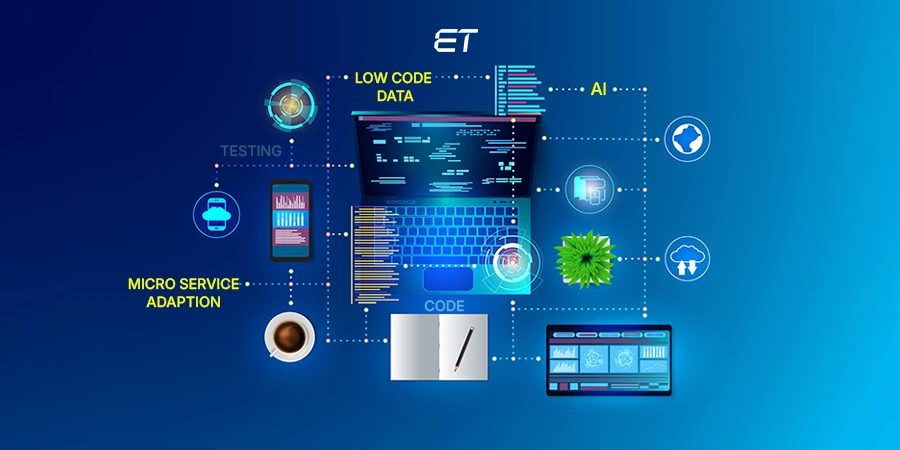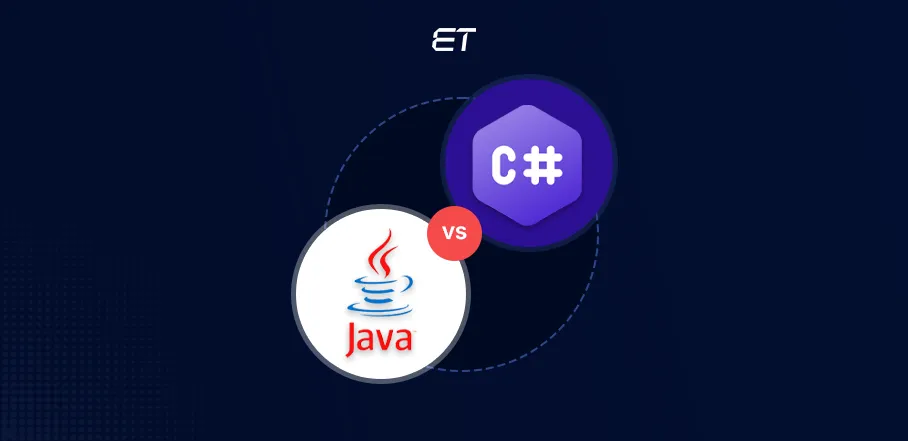
C# vs Java: Decoding the Right Fit for your Application Development
Imagine standing at a crossroads, one path leading to an innovative digital transformation with Java, the other promising streamlined efficiency with C#. Both routes are paved with potential, yet each offers a distinct journey. As a leader steering your enterprise towards growth, the decision isn’t just about choosing a programming language—it’s about setting the foundation for the future.
C# vs Java aren’t just tools for developers; they’re the driving forces behind countless enterprise solutions, powering everything from mobile apps to large-scale systems. Discussing the key differences of C# vs Java, we see that C# is tightly integrated with Microsoft technologies, while Java offers broader platform independence. They’ve been the backbone of industries for decades, but deciding which suits your business vision isn’t always straightforward.
This blog isn’t about picking sides. It’s about equipping you with the insights to choose the language that best aligns with your business goals, technical needs, and scalability requirements. Let’s decode the strengths and strategies of C# vs Java to help you confidently take the next step.
What is C# Object Oriented Programming Language?
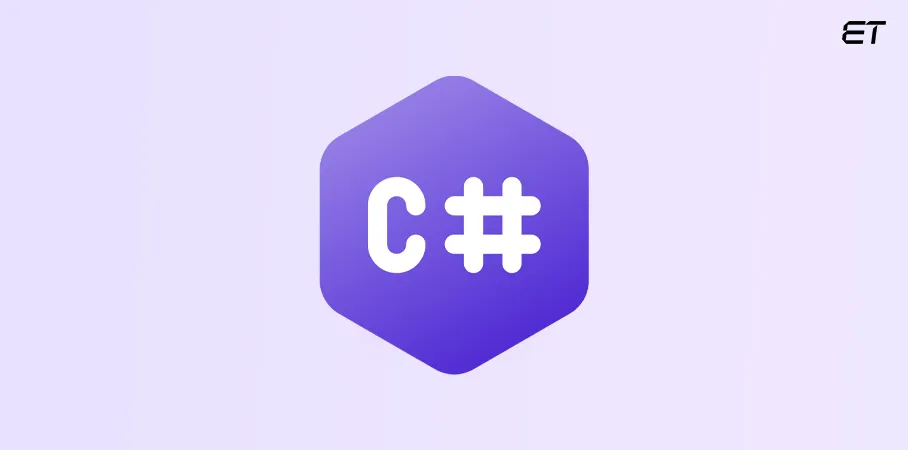
C# (pronounced as “C Sharp”) is a modern, object-oriented programming language developed by Microsoft in 2000. Both C# and Java are categorized as object-oriented programming languages, highlighting their extensive libraries and varied applications. It was created as part of the .NET framework to compete directly with Java and C, highlighting the strengths of each in their respective development environments. It has since evolved into a robust and versatile language for building everything from Windows desktop applications to cloud-based systems.
Key Features of C#
1. Object-Oriented and Component-Oriented: Like Java, C# is object-oriented, but it also supports component-oriented programming, which focuses on breaking applications into smaller, reusable components. This makes C# particularly efficient for large, modular applications.
2. Integration with .NET Framework: C# is designed to work seamlessly with Microsoft’s .NET framework, which provides a comprehensive pre-built code library for tasks like file manipulation, database access, and web services. This makes development faster and more streamlined.
3. Windows-Centric Development: While C# was initially built for Windows applications, it has now grown to support cross-platform development with .NET Core and .NET 5. Developers can now use C# to create applications for Linux, macOS, and mobile platforms.
4. Garbage Collection and Memory Management: C# includes automatic memory management features like garbage collection, reducing the risk of memory leaks and simplifying development.
5. Advanced Features for Modern Applications: C# supports asynchronous programming, LINQ (Language Integrated Query), and advanced debugging tools, making it ideal for cloud-native and real-time applications.
Why Does C# Stand Out?
C# has a strong foothold in industries where Windows-based systems dominate, such as enterprise IT and desktop applications. It is also widely used in game development due to its compatibility with Unity, a popular game engine. Its integration with Microsoft Azure makes it a go-to choice for cloud computing projects.
What is Java Runtime Environment?
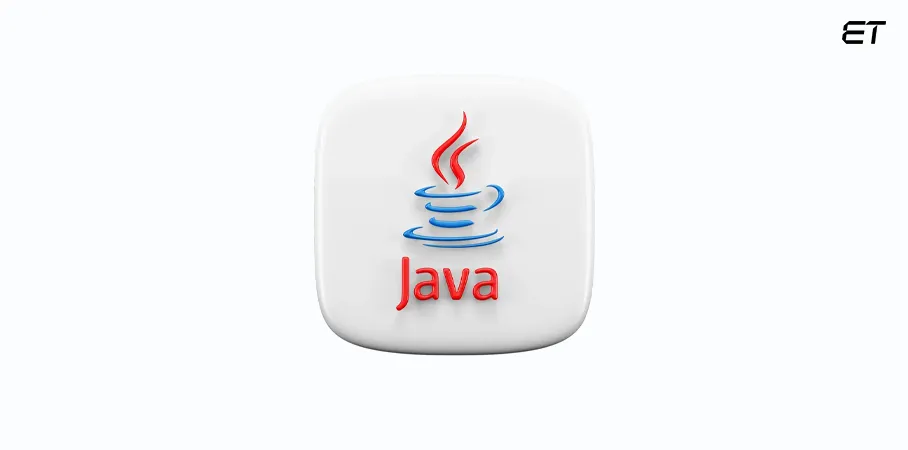
Java is one of the world’s most widely used programming languages, known for its reliability, platform independence, and versatility. The Java compiler plays a crucial role in generating platform-independent bytecodes, which enhances the reliability and versatility of Java in microservices architecture. The Java programming language stands out for its features and application flexibility, making it a preferred choice for web development, particularly for Android and cloud-based applications. Created by Sun Microsystems (now owned by Oracle) in 1995, Java was designed with a revolutionary concept: Write Once, Run Anywhere (WORA). This means that Java programs can run on any system that supports the Java Virtual Machine (JVM), regardless of the underlying hardware or operating system.
Key Features of Java
1. Object-Oriented: Java revolves around objects, making it easier to design, maintain, and scale applications. Concepts like inheritance, encapsulation, and polymorphism make Java ideal for building complex, reusable codebases.
2. Platform Independence: Java doesn’t compile code directly into machine language, unlike other languages. Instead, it converts code into an intermediate form called bytecode, which runs on the JVM. This is what makes Java applications portable across various operating systems like Windows, macOS, and Linux.
3. Robust and Secure: Java comes with strong memory management features, automatic garbage collection, and built-in security mechanisms. These features make it a preferred choice for developing secure applications, especially for banking and e-commerce platforms.
4. Rich Ecosystem of Tools and Frameworks: Java has a vast library of tools and frameworks, such as Spring, Hibernate, and Apache Struts, which simplify the development of enterprise applications.
5. Diverse Use Cases: Java’s versatility makes it a favorite among developers, from building Android apps to developing server-side applications. It powers websites, banking software, scientific systems, and even IoT applications.
Why is Java Popular?
Java’s simplicity and flexibility have earned it a massive global developer community. It’s particularly favored in industries requiring high-performance systems that can scale as businesses grow. Additionally, Oracle continuously updates Java, ensuring it remains relevant in modern software development.
C# vs Java: A Detailed Comparison
Choosing C Sharp vs Java can be a difficult decision for you to make, especially if you’re not completely aware of what each language has to offer, its unique strengths and the different development needs they cater to.
Below is a comprehensive, point-by-point comparison that will help you understand their differences, making it easier to decide which one aligns better with your requirements.
| Criteria | C# | Java |
| Platform Independence | Initially Windows-centric, now cross-platform with .NET Core and .NET 5, but less naturally portable. | Highly portable with “Write Once, Run Anywhere” (WORA) via Java Virtual Machine (JVM). |
| Ecosystem and Frameworks | Strong integration with ASP.NET, Xamarin for mobile apps, and Unity for game development. | Extensive frameworks like Spring and Hibernate for enterprise systems; dominant in Android development. |
| Performance | Optimized with Common Language Runtime (CLR) and ahead-of-time (AOT) compilation; excels in Windows-based tasks. | Relies on JVM and Just-In-Time (JIT) compilation; good for most tasks but slower in high-speed needs. |
| Syntax and Ease of Use | Modern and concise with advanced features like properties, delegates, and LINQ for simplicity. | Simple and beginner-friendly, but verbose. |
| Security Features | Includes Code Access Security (CAS) and .NET security, robust for enterprise-grade solutions. | Offers strong security with Security Manager and type checking, ideal for regulated industries. |
| Use Cases | Windows applications, Azure cloud solutions, Unity game development, and web apps with ASP.NET. | Enterprise systems, Android apps, big data, IoT, and scientific applications |
1. C# vs Java — Platform Independence
C#:
C# was initially developed as a Windows-centric language, tightly integrated with Microsoft’s .NET framework, making the Windows operating system a central focus in the development process. This means it was best suited for Windows-based environments, offering seamless development for desktop and web applications. However, with the introduction of .NET Core and later .NET 5, C# has evolved into a cross-platform language capable of running on Linux, macOS, and Windows.
While C# now supports platform independence, it relies heavily on the .NET runtime rather than a virtual machine like Java. This makes it highly efficient for certain tasks but less naturally portable than Java. C# is particularly advantageous for businesses that are already invested in the Microsoft ecosystem, as it integrates effortlessly with other Microsoft technologies.
Java:
One of Java’s biggest strengths is its “Write Once, Run Anywhere” (WORA) philosophy. The Java compiler plays a crucial role in this by generating bytecodes that are platform-independent, contributing to Java’s reliability and versatility in microservices architecture. This means that once you write and compile Java code, it can run on any operating system or hardware that supports the Java Virtual Machine (JVM). The JVM acts as an intermediary, converting bytecode (Java’s compiled form) into machine code that the host system understands. This makes Java highly portable and ideal for environments where cross-platform compatibility is essential, such as large-scale enterprise systems or distributed applications.
Furthermore, Java’s platform independence makes it a preferred choice for global businesses that need to maintain consistency across diverse systems. Whether you are running Java applications on Windows, macOS, Linux, or even mainframes, you get the same performance and functionality. However, it’s important to note that Java’s reliance on the Java Runtime Environment (JRE) involves additional compilation layers, which can slow down execution time compared to C#’s direct compilation to native code, emphasizing the differences in performance and operational characteristics between the two programming languages.
Verdict:
If cross-platform compatibility is your priority, Java offers a more mature solution. C#, on the other hand, is an excellent choice for projects centered on Windows or for businesses leveraging the .NET ecosystem.
2. C# vs Java — Ecosystem and Frameworks for Software Development
C#:
C# has a rich ecosystem, particularly for developers working within the Microsoft environment. Frameworks like ASP.NET make it a go-to choice for creating dynamic and scalable web applications. Additionally, Xamarin enables developers to build cross-platform mobile apps using C#, making it competitive in the mobile development space.
A significant advantage of C# is its compatibility with the Unity game engine, making it the preferred language for game developers. Beyond gaming, C#’s tight integration with Microsoft Azure simplifies the creation of cloud-based solutions, making it highly relevant in the age of cloud computing.
Java:
Java, one of the most extensive ecosystems among object oriented programming languages, boasts a robust framework that makes it a dominant choice for enterprise-grade web and backend development. Its frameworks, like Spring and Hibernate, are particularly notable. In web development, both Java and C# are employed in creating scalable and dynamic web-based applications. Spring, in particular, simplifies the creation of strong, scalable web applications, while Hibernate ensures seamless database management.
Java is also the backbone of Android app development, powering a majority of Android applications through the Android SDK. This makes Java indispensable for businesses focusing on mobile platforms. Additionally, Java’s strong presence in the big data domain, with tools like Apache Hadoop and Apache Kafka, cements its role in powering data-intensive applications.
Verdict:
Choose Java for enterprise systems, Android apps, and big data solutions. Opt for C# for Windows-based applications, cloud solutions, and game development.
3. C# vs Java — Performance
C#:
C# also uses JIT compilation through the Common Language Runtime (CLR), but its tight integration with the .NET framework gives it an edge in performance, especially in Windows environments. Additionally, ahead-of-time (AOT) compilation introduced in .NET 5 allows developers to compile code directly into native code, bypassing the need for runtime interpretation and significantly boosting performance.
Java:
Java’s performance relies heavily on the JVM, which interprets bytecode into machine code during runtime. This intermediate step can result in slower execution compared to compiled languages like C++. However, Java’s Just-In-Time (JIT) compiler mitigates this issue by dynamically optimizing code during execution, enhancing performance for frequently used operations.
While Java’s performance is adequate for most applications, it may lag in scenarios requiring real-time processing or where execution speed is critical, such as gaming or high-frequency trading.
Verdict:
C# offers a slight performance advantage in Windows-based and high-performance applications. Java is sufficient for most enterprise tasks but may require optimization for high-speed needs.
4. C# vs Java — Syntax and Ease of Use
C#:
C# was designed with simplicity in mind, incorporating several modern features that Java lacks. Visual Studio plays a crucial role in enhancing the development experience for C#, offering extensive integration capabilities, a user-friendly interface, and powerful tools such as IntelliSense and debugging features. For instance, properties in C# simplify the creation of getter and setter methods, while delegates and events provide powerful tools for handling asynchronous programming.
Additionally, features like LINQ (Language Integrated Query) allow developers to query data sources directly from the code, reducing complexity.
Java:
Java’s syntax is straightforward and beginner-friendly, making it an excellent starting point for new developers. However, Java’s verbosity can sometimes make code longer and more repetitive compared to modern languages. For example, defining simple getter and setter methods requires additional lines of code in Java, which can be automated in C#.
Verdict:
C# offers a more modern and concise syntax, making it easier for developers familiar with advanced programming concepts to use. Java’s simplicity remains advantageous for beginners.
5. C# vs Java — Security Features
C#:
C# incorporates robust security measures such as Code Access Security (CAS) and strong type checking. Its integration with the .NET framework adds an extra layer of security, particularly for enterprise applications that require compliance with strict regulatory standards.
Java:
Java emphasizes security with features like the Security Manager, which controls access to system resources. It also includes built-in mechanisms for exception handling and type checking, reducing vulnerabilities caused by programming errors. These features make Java particularly suitable for banking and financial systems where security is paramount.
Verdict:
Both languages prioritize security, but Java’s mature tools and frameworks give it an edge for highly regulated industries.
6. C# vs Java — Use Cases
C#:
- Windows desktop applications.
- Scalable cloud solutions using Azure.
- Game development with Unity.
- Web applications using ASP.NET.
Java:
- Enterprise applications requiring cross-platform compatibility.
- Android app development.
- Big data processing and analytics.
- Scientific and IoT applications.
Verdict:
Choose Java for versatility and wide-ranging use cases. C# excels in specialized fields like gaming and cloud computing.
Master Java’s power—dive into the ultimate guide to frameworks tailored for your business needs!
C# vs Java — What to Choose?
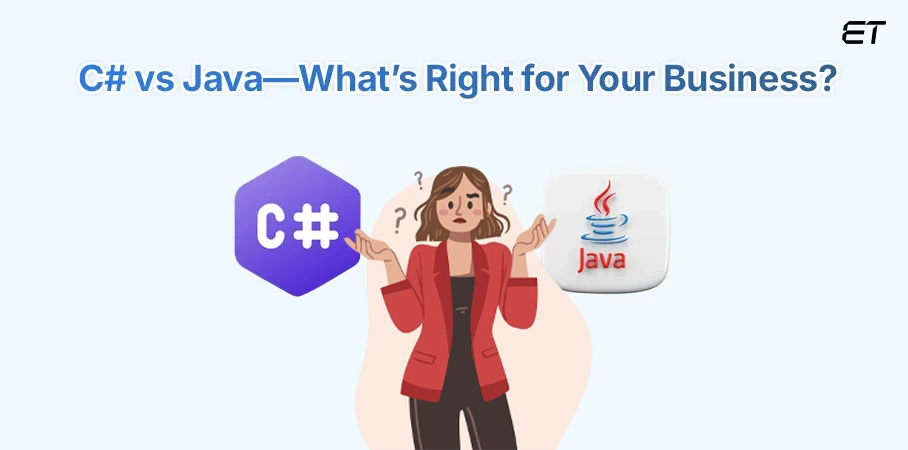
Choosing between C# vs Java is not about finding the “better” language but selecting the one that aligns with your project’s specific needs and business goals.
- Choose C# if you’re working within the Microsoft ecosystem, need high performance for Windows-based systems, or are venturing into game development and cloud-native solutions. Its modern features and seamless integration with tools like Azure and Unity make it a standout option in these areas.
- Opt for Java if your focus is on building cross-platform applications, large-scale enterprise systems, or Android mobile apps. Its platform independence and robust ecosystem make it an excellent choice for industries requiring flexibility and scalability.
Ultimately, both languages are powerful, reliable, and future-proof. Your decision should guide your technical requirements, team expertise, and long-term vision. With either choice, you’re investing in a language capable of delivering impactful results.
Want to harness the synergy of Java and C# for impactful solutions for your business?
Frequently Asked Questions
1. In C# vs Java comparison, is C# better than Java?
C# vs Java excels in different scenarios. C# is better for Windows applications, game development, and cloud-native solutions with Azure. Whereas, Java is ideal for cross-platform compatibility, enterprise applications, and Android development. The better choice depends on your specific project needs.
2. Will C# overtake Java?
While C# continues to grow, especially in game development and cloud solutions, Java remains a leader in enterprise systems and Android apps due to its platform independence and widespread use. Both languages will likely coexist, dominating their respective domains.
3. When compared C# vs Java developers, who earns more?
Salaries for C# vs Java developers depend on factors like location, experience, and industry. Java developers often find opportunities in enterprise and mobile app development, while C# developers are in demand for gaming, Windows, and cloud solutions.
4. Is C# hard if I know Java?
No, C# is not hard if you already know Java. Both languages share a similar syntax and object-oriented foundation. Learning C# primarily involves understanding its .NET framework and additional features like LINQ and delegates.



